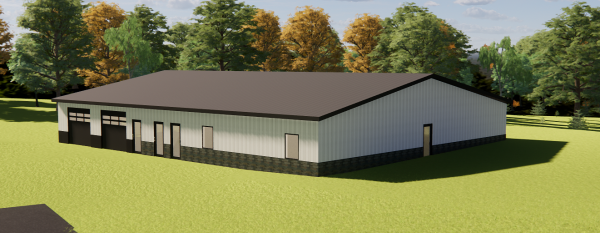
AUBURN – As expanded academic, athletic and campus life returns to Central Maine Community College (CMCC) this fall, students will be greeted with a new building, the Public Service Simulation Center overlooking Lake Auburn. Students will also have an opportunity to enroll in a new Conservation Law Enforcement or Social Sciences program.
Public Service Simulation Center
At nearly 4,500 sq. ft, the new Public Service Simulation Center will be a dynamic multi-program training facility for students in Conservation Law Enforcement, Forensic Science, Justice Studies, Criminal Justice, Police Operations, and Social Sciences. Students in these programs will have the opportunity to gain hands-on, real-world training in a human-first approach to help individuals in the communities they serve after graduation.
Through the Foundation for Maine’s Community Colleges, the Public Service Simulation Center is funded in part by The Davis Family Foundation, a public charitable foundation established to support educational, medical and cultural/arts organizations located primarily in Maine. The Foundation has provided more than $63.5 million in grants since its grantmaking activities began in 1986.
The facility houses a dual-bay garage, briefing room, simulation room, scenario prep room, classroom, control room and changing/restroom area. Utilizing moveable walls, the facility will allow instructors to adapt the environment to maximize training experiences. In addition to using the facility to train CMCC students, local public service agencies will access the space for employee training and development.
Matt Tifft, chair of the Public Service and Social Science department, said he and the other department instructors are looking forward to utilizing the new facility to provide students with real-life skills, allowing them to remain confident and calm in the field.
“Our focus is on communication and de-escalation, safe restraint methods and crisis intervention training as our students will work with vulnerable populations, including the mentally ill. When students graduate, they will have many higher-level skills, including the ability to identify indicators of aggression and to employ methods designed to achieve a peaceful resolution.”
“The innovation for these new academic programs and learning spaces is the result of the passion from the faculty in our Public Service and Social Sciences department,” noted CMCC Interim President Betsy Libby. “They are well connected to their professional colleagues across the state and continue to create opportunities to meet Maine’s workforce needs.”
“The curriculum is developed by the faculty based on their real-world experiences in public service careers, with many of the adjunct faculty currently employed full-time in the field,” said Tifft. He notes faculty experience includes positions with the State Police Major Crimes Unit, death investigator with the Maine Medical Examiner’s office, former district attorney, lieutenant with the Auburn Police Department, game warden with the Maine Warden Service, state and local law enforcement officials, and clinical counselors.
New Conservation Law Enforcement Program
In partnership with Washington County Community College (WCCC), Conservation Law Enforcement – available as a two-year degree or one year certificate – provides students with the fundamental knowledge to pursue careers involving natural resources protection, management of wildlife resources and the enforcement of laws governing these resources. By combining biological principles with law enforcement practice and theory, students will graduate with a background in criminal justice, natural resource law, wildlife and land conservation.
Libby sees a unique opportunity for CMCC and WCCC to share resources, benefiting students with increased offerings. “Students can complete the entire Conservation Law Enforcement program through CMCC, or take advantage of options at WCCC like a course providing a wilderness first responder certification and other activities exposing students to the natural resources of Downeast Maine,” she said.
Graduates of the program will help meet the need of Maine-based, environment-focused law enforcement agencies. Colonel Jay Carroll of Maine Marine Patrol noted, “Recruitment remains a high priority for our agency, and programs like this one provide a target audience for our recruiting efforts.”
New Social Sciences Program
The new Associate in Arts degree in Social Sciences is an interdisciplinary program examining the study of human behavior, combining approaches from psychology, sociology, natural science, cultural and organizational studies as a foundation for transfer to a four-year college or university. Students in the Social Sciences program will take courses in public policy, ethics, issues in diversity, anthropology and more.
Central Maine Community College provides quality, accessible college education and lifelong learning opportunities by offering career and technical education, education for transfer to CMCC is an equal opportunity/affirmative action institution and employer. Please visit www.cmcc.edu/eeoc or call the Office of Human Resources at (207) 755-5396.




